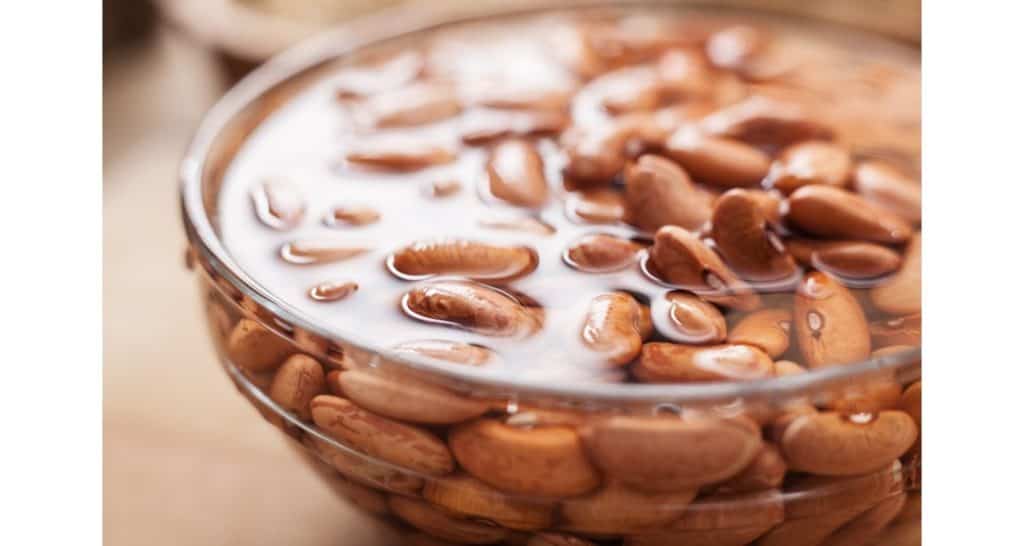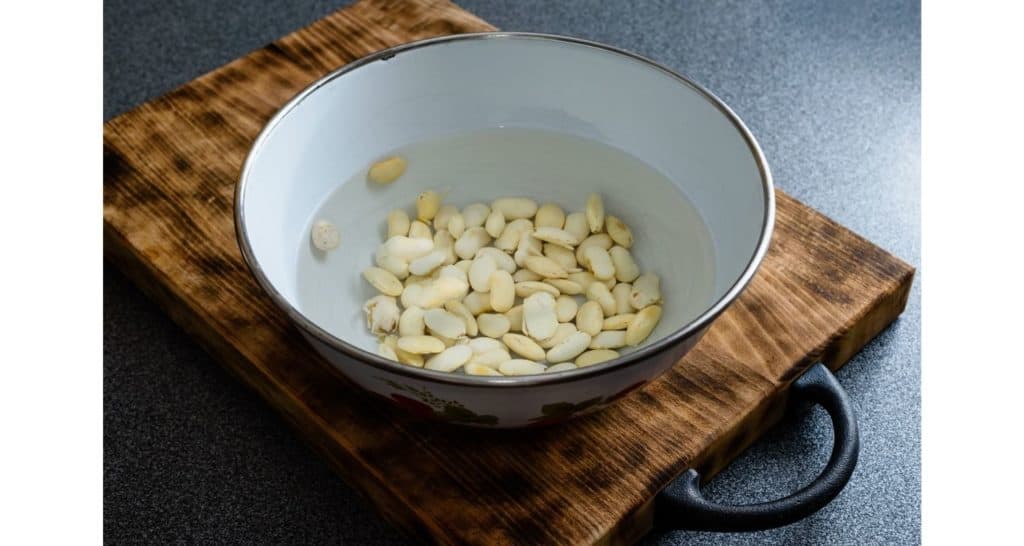Beans are a great addition to many home-cooked meals. These fiber-packed goodies are cheap in price and offer good nutritional value.
However, if beans are not prepared properly they can cause some intestinal discomfort and may take a bit longer to cook. These issues are usually resolved by soaking the beans before cooking. But this begs the question – how long should you soak your beans and how long is too long?
So can you soak beans for too long?
Beans should not be soaked for more than 24 hours. In fact, beans can be “quick soaked” for as little as 15 minutes or as long as a regular overnight soak. Beans that are soaked for over 24 hours at room temperature may start to ferment which can smell rotten.
Cooking fermented beans will eliminate most of the enzymes, probiotics, and smells that form so they should be safe to consume. However, if the beans show any signs of mold or other bacteria then discard the batch of beans.
I recommend using this clip-on strainer that snaps onto pots, pans, and bowls to easily strain your soaked beans.
Let’s cover the benefits of soaking your beans and review tips for making your next batch of beans delicious and nutritious.
The Great Bean Debate: Should We Soak Beans?
I won’t dig into the great debate of whether or not you should soak your beans. I’ve been able to cook beans without soaking but, personally, I do soak my beans before cooking them.
I recommend soaking your beans since you can add salt, bay leaves, onions, and other seasonings to the pot of water before cooking the beans.
It’s similar to marinating meat before cooking it. The beans will taste better if they’re marinating in spices before cooking.
Soaked beans that are cooked in the soaking water will also taste better. The bean’s color will be darker or richer since all of the bean flavor is marinating in that water. Not to mention the bean water will transform into a flavorful bean sauce.
Epicurious tested some bean soaking myths and verified that beans cooked in the soaking water will look and taste better.
So my vote is for soaking beans when you can. It’s not the end of the world if you don’t have the time to soak beans before cooking them.
How To Soak Beans
The Bean Institute has provided the following three common bean soaking methods depending on how much time you have.

We’ll first cover the faster soaking methods since I tend to forget to soak my beans overnight.
Quick Soak Method
The quick soak is the fastest soaking method for your beans. Here are the steps for the quick soak:
- Place beans in large pot and rinse with water to remove any shells or debris
- Drain the beans of the rinse water and add 3 cups of water for every 1 cup of beans
- Add your favorite seasonings such as salt, bay leaves, and onions
- Wait 15 minutes before cooking
After the 15 minutes soaking is done, you can cook the beans normally on the stovetop. I do not drain the beans again since this soaking water contains all the seasoning.
I use this method the most often since it gets the job done in a hurry. Not to mention the bean sauce will be thick and creamy if the beans are cooked with the lid off and the excess water is allowed to evaporate.
Hot Soak Method
The hot soak method is the second fasted method for soaking your beans. This method is a great option if you are preparing beans for lunch or dinner and have a few hours before the beans need to be cooked.
Here are the steps for the hot soak method:
- Place beans in large pot and add 5 cups of water for every cup of beans
- Heat pot to boil for 2 to 3 minutes
- Remove beans from heat, cover, and let rest for 4 hours
- Drain and rinse the beans
After the 4 hours of rest, the beans will be softer and easier to cook. These beans are in the perfect stage to season them since their outer shells will be softer or cracked.
Traditional Overnight Soak Method
The overnight soak method is the most common method for soaking beans.
Here are the steps for soaking beans overnight:
- Place beans in large pot and add water so all beans are submerged
- Soak beans for 8 hours or overnight
- Drain and rinse the beans
After the beans have soaked overnight, they may appear wrinkled which is ok. The beans will rehydrate when they’re cooked.
Soaking Large Beans
Soaking small beans, such as pinto or black beans, isn’t necessary since these beans can cook thoroughly without soaking ahead of time. However, the flavor and texture improves with a good soak.
However, large beans such as kidney or white beans are completely different.

Soaking large beans will decrease the cook time dramatically since the water will penetrate the thicker bean allowing it to cook faster and evenly. Allowing large beans to soak in seasoned water will also improve the flavor of the cooked beans.
Can You Soak Beans For Too Long?
There are plenty of options when it comes to soaking beans for as quickly as 15 minutes and as long as overnight. So we don’t need to go crazy and soak beans for days in order to prepare them.
Although there isn’t a specific timeline for when soaked beans go bad, there will be a time when the beans start to ferment. Typically fermentation begins after about 24 hours if the beans are soaking in room temperature water.
Fermentation is a natural process that happens when bacteria begins to digest carbs, such as sugar and starch, into acid or alcohol. Beans have a high level of starch which means it’s a good fuel for fermentation.
Fermentation isn’t necessarily a bad thing. Fermentation was actually a common practice in ancient times to preserve food.
However, it’s best to just cook your beans without allowing bacteria to start forming and fermenting your beans. It can make you sick if the beans are not cooked properly.
Scientific and Health Reasons For Soaking Beans
Even though beans are a healthy food choice, some may contain a trace amount of toxins.
For example, red kidney beans can contain a toxic lectin named phytohemagglutinin. This toxin can be present in raw or undercooked beans.
Eating beans that contain these toxins will likely cause nausea and stomach pain. You can remove phytohaemagglutinin and other toxins by soaking the beans before cooking them.
Another reason to soak your beans is to reduce antinutrients.
Antinutrients such as lectins, phytate or calcium oxalate block the nutrient uptake. These antinutrients are in the skin of the beans so soaking the beans will help dissolve them.
Scientific and Health Benefits Of Soaking Beans
If you consume beans without soaking them, you may experience some side effects like bloating.
However by simply soaking beans before cooking them, you will be decreasing the chances of experiencing the most common effects that we are so familiar with when consuming beans.
Here are some of the most common benefits of soaking beans:
Beans have natural antinutrients, which aren’t all bad as those can also be beneficial but not in large quantities. However, these antinutrients block your body’s ability to absorb some of the nutrients of beans. So soaking will improve the absorption of nutrients.
- Decreases the chances of contaminants
It’s common to have debris, shells, and other things mixed in with the dry beans. So by soaking the beans before cooking, you are allowing the beans to get cleaned thoroughly. This ensures you’re eating beans and not something else.
- Helps reduce flatulence and bloating
Some people experience intestinal issues after consuming beans. There is a type of fiber called raffinose which can lead to some digestive problems. Simply soaking beans before cooking them can decrease raffinose by 75%.
Final Thoughts
There are many reasons why you should include beans in your diet. The first being that beans are delicious and nutritious!
Beans also help with weight loss, promote your heart’s health and even potentially help fight type 2 diabetes.
So break out that big pot and toss those beans in there. Give them a good soak even if it’s as short as 15 minutes so you can enjoy freshly cooked beans in your next meal.

